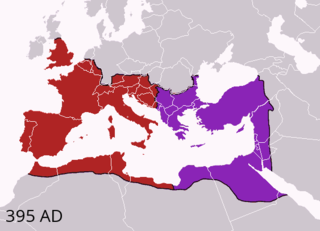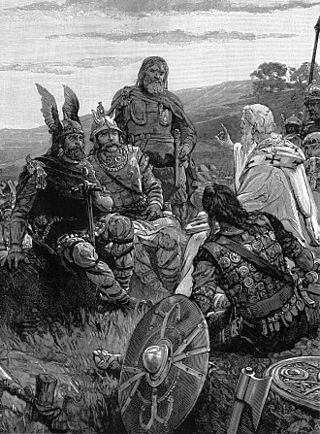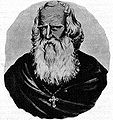The 400s decade ran from January 1, 400, to December 31, 409.
Year 385 (CCCLXXXV) was a common year starting on Wednesday of the Julian calendar. At the time, it was known as the Year of the Consulship of Augustus and Bauto. The denomination 385 for this year has been used since the early medieval period, when the Anno Domini calendar era became the prevalent method in Europe for naming years.
The 380s decade ran from January 1, 380, to December 31, 389.

Year 395 (CCCXCV) was a common year starting on Monday of the Julian calendar. At the time, it was known as the Year of the Consulship of Olybrius and Probinus. The denomination 395 for this year has been used since the early medieval period, when the Anno Domini calendar era became the prevalent method in Europe for naming years.
The 390s decade ran from January 1, 390 to December 31, 399

Year 366 (CCCLXVI) was a common year starting on Sunday of the Julian calendar. At the time, it was known as the Year of the Consulship of Gratianus and Dagalaifus. The denomination 366 for this year has been used since the early medieval period, when the Anno Domini calendar era became the prevalent method in Europe for naming years.
The 360s decade ran from January 1, 360, to December 31, 369.
The 330s decade ran from January 1, 330, to December 31, 339.
The 340s decade ran from January 1, 340, to December 31, 349.
The 350s decade ran from January 1, 350, to December 31, 359.
The 370s decade ran from January 1, 370, to December 31, 379.
Year 356 (CCCLVI) was a leap year starting on Monday of the Julian calendar. At the time, it was known as the Year of the Consulship of Constantius and Iulianus. The denomination 356 for this year has been used since the early medieval period, when the Anno Domini calendar era became the prevalent method in Europe for naming years.

Year 355 (CCCLV) was a common year starting on Sunday of the Julian calendar. At the time, it was known as the Year of the Consulship of Arbitio and Maesius. The denomination 355 for this year has been used since the early medieval period, when the Anno Domini calendar era became the prevalent method in Europe for naming years.

Year 386 (CCCLXXXVI) was a common year starting on Thursday of the Julian calendar. At the time, it was known as the Year of the Consulship of Honorius and Euodius. The denomination 386 for this year has been used since the early medieval period, when the Anno Domini calendar era became the prevalent method in Europe for naming years.

Year 384 (CCCLXXXIV) was a leap year starting on Monday of the Julian calendar. At the time, it was known as the Year of the Consulship of Ricomer and Clearchus. The denomination 384 for this year has been used since the early medieval period, when the Anno Domini calendar era became the prevalent method in Europe for giving names to years.
Year 367 (CCCLXVII) was a common year starting on Monday of the Julian calendar. At the time, it was known as the Year of the Consulship of Lupicinus and Iovanus. The denomination 367 for this year has been used since the early medieval period, when the Anno Domini calendar era became the prevalent method in Europe for naming years.

Year 369 (CCCLXIX) was a common year starting on Thursday of the Julian calendar. At the time, it was known as the Year of the Consulship of Galates and Victor. The denomination 369 for this year has been used since the early medieval period, when the Anno Domini calendar era became the prevalent method in Europe for naming years.
Year 362 (CCCLXII) was a common year starting on Tuesday of the Julian calendar. At the time, it was known as the Year of the Consulship of Mamertinus and Nevitta. The denomination 362 for this year has been used since the early medieval period, when the Anno Domini calendar era became the prevalent method in Europe for naming years.

Year 360 (CCCLX) was a leap year starting on Saturday of the Julian calendar. At the time, it was known as the Year of the Consulship of Constantius and Iulianus. The denomination 360 for this year has been used since the early medieval period, when the Anno Domini calendar era became the prevalent method in Europe for naming years.

Year 337 (CCCXXXVII) was a common year starting on Saturday of the Julian calendar. At the time, it was known as the Year of the Consulship of Felicianus and Titianus. The denomination 337 for this year has been used since the early medieval period, when the Anno Domini calendar era became the prevalent method in Europe for naming years.









